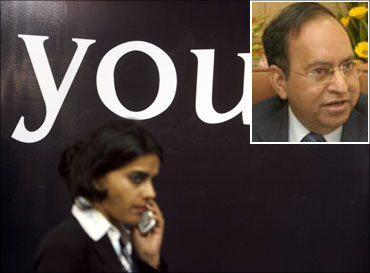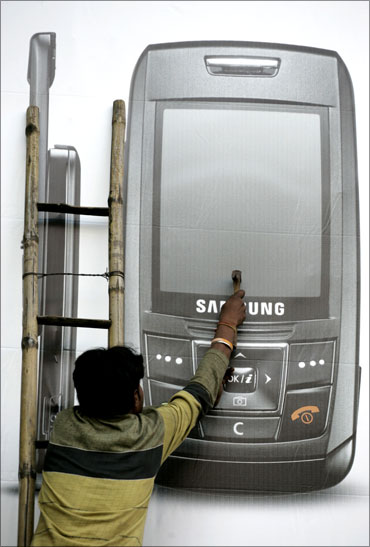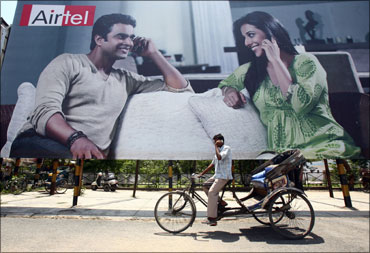
Telecom Regulatory Authority of India chairman J S Sarma says he'll soon have to buy a crash helmet to protect him from mobile service providers.
He may be joking, but he's not exaggerating the anger of the telecom companies. Last week, he submitted a report on spectrum management that could raise their costs significantly, should the government accept it.
Sarma-led Trai's report recommended that operators pay for excess spectrum, the radio frequencies that enable mobile communication, they hold above the mandated 6.2 MHz at prices based on the just-concluded auction for 3G or third-generation spectrum.
This means that leading players like Bharti, Vodafone, Idea and state-owned BSNL will have to collectively fork out over Rs 17,000 crore (Rs 170 billion). Trai has also suggested that the 11 operators with licence renewals due from 2014 pay over Rs 100,000 crore (Rs 1 trillion) for fresh spectrum for 2G services.
Sarma, however, is not committing himself to these proposals. He is leaving it to the technical experts to study whether it is tenable to link 2G and 3G spectrum prices -- especially after Communications Minister A Raja likened 2G spectrum to ration shop rice and 3G to basmati. All the same, he is taking care to meet telecom chiefs like Sunil Mittal to explain Trai's stance.
Neither telecom nor telecom-related controversy is new to the 62-year-old Trai chief. As recently as last October, Sarma told journalists at a telecom conference in Geneva that he may make it mandatory for service providers to offer per-second billing plans.
Click NEXT to read on . . .

Not surprisingly, telecom stocks plunged 15 to 20 per cent the next day with operators complaining that Sarma was reverting to the bad old days of administered pricing.
Also, Sarma's announcement came just after Tata Teleservices, the new GSM technology player, launched a per-second billing offer, making it look as though he were supporting the new operator.
On his return from Geneva, Sarma clarified that per-second billing was not an explicit recommendation but the subject of a consultation paper that was due in about one and a half months.
Ironically, he did not have to push the proposal too far. Confronted by the success of the Tata Teleservices offering, all operators -- including reluctant incumbents like Airtel -- eventually introduced per-second billing offers.
Sarma, a 1971-batch Indian Adminstrative Service officer, has worked in the ministries of defence, chemical and fertilisers and rural development. But his tryst with telecom has been a long and sometimes controversial one.
He was additional secretary in the department of telecommunications (DoT) but soon took over the hot seat of secretary in 2005 which he held for a year. Before joining Trai last May, Sarma was a member of the Telecom Disputes Settlement and Appellate Tribunal (TDSAT).
Click NEXT to read on . . .

And it was here that Sarma endorsed Raja's decision to allow 'dual technology' licences, a move that benefited Reliance Communications and Tata Teleservices, the two CDMA-technology mobile operators that quickly received spectrum to roll out GSM services within the same licence.
He also endorsed Raja's decision to give out fresh 2G licences at only Rs 1,650 crore (Rs 16.50 billion), the 2001 price, on a first-come, first-served basis.
Raja, of course, has come in for flak for many of the decisions TDSAT endorsed, not least of which is accusation that he gave away 2G spectrum virtually free, causing the government huge revenue losses. The attack has been so shrill that a CBI enquiry is currently underway on the award of 2G licences.
Operators say it is ironical that Sarma as Trai boss is now suggesting that the same operators should pay premiums for spectrum in the future, though he was willing to endorse its distribution at a throwaway price as a TDSAT member.
Certainly, Sarma has had to do some tightrope walking in making the transition from TDSAT to Trai. When he took over as chairman, he said he was open to the regulator challenging any of his decisions in court.
The question is whether Sarma can balance the competing demands of different operators vis- -vis Trai's latest report. The GSM lobby has opposed it; Reliance Communications has endorsed it and Tata Communications has demanded a level playing field. Ask Sarma and he merely says: "As far as I am concerned the report is over, it is for the government to decide."